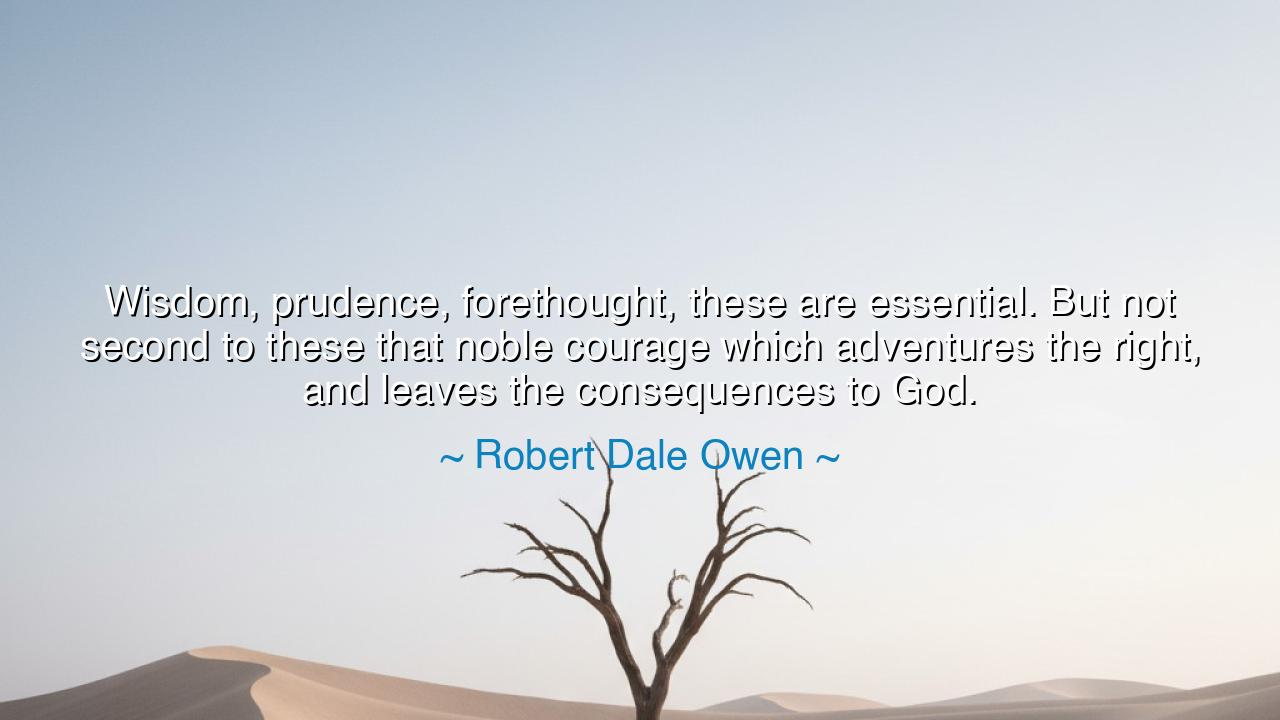
Wisdom, prudence, forethought, these are essential. But not
Wisdom, prudence, forethought, these are essential. But not second to these that noble courage which adventures the right, and leaves the consequences to God.






“Wisdom, prudence, forethought, these are essential. But not second to these that noble courage which adventures the right, and leaves the consequences to God.” Thus spoke Robert Dale Owen, a thinker and reformer whose life was guided by the fierce light of moral conviction. In these words, he draws the map of a balanced soul — one that wields both the calm clarity of wisdom and the fiery strength of courage. He reminds us that intellect alone is not enough to change the world, nor is caution alone enough to defend the truth. There must be, above calculation and fear, a divine boldness — a willingness to do what is right and entrust the outcome to the unseen hands of Providence.
The origin of this saying can be traced to Owen’s life and philosophy as a 19th-century reformer — a man of reason, yet also of moral fire. He was the son of the industrial visionary Robert Owen, but unlike his father, who placed faith in social structures, Robert Dale Owen placed his faith in the conscience of the individual. He believed that wisdom and prudence are sacred virtues — the lamp by which man walks safely through the darkness of error. Yet, he also saw that too much caution can become cowardice, that too much forethought can strangle action. In an age of injustice and uncertainty, Owen called upon the people to remember that reason must serve courage, not replace it. For it is not the careful man who changes the world, but the one who ventures the right, even when the cost is great.
To adventure the right is to act not for gain, nor from pride, but from a devotion to truth that transcends fear. It is to do what conscience commands, even when the path is shrouded in peril. This is the courage of the prophets, the reformers, and the heroes who walk in light while others wait for safety. Owen, who championed the abolition of slavery and the advancement of women’s rights, knew well the storms that follow such conviction. Yet he also knew that a just action, born of purity and courage, has a power beyond calculation — for once set in motion, it belongs not to man, but to God.
Consider the example of William Wilberforce, who, for decades, stood nearly alone in his struggle to end the British slave trade. He used wisdom and prudence — gathering evidence, persuading Parliament, appealing to reason. Yet what sustained him through years of ridicule and defeat was something deeper: that noble courage which “leaves the consequences to God.” He did not know if he would live to see victory; he only knew the fight was right. And when at last the trade was abolished, it was not merely a triumph of law, but of faith — the fulfillment of Owen’s ideal that courage, guided by wisdom, can become the instrument of divine justice.
Owen’s message warns against the paralysis of overthinking — that subtle fear disguised as caution which has delayed many a noble deed. Forethought is sacred when it prepares the mind for action, but destructive when it becomes an excuse to avoid risk. The soul that waits for perfect certainty will wait forever. There are moments when reason must give way to faith, when a man must act though the way is dark. Such courage is not reckless, for it is guided by prudence, but it is fearless, for it trusts that truth itself is protected by the eternal law of God.
This teaching is as ancient as it is modern. In the scriptures and the legends of every age, we find this balance praised — the wisdom of Solomon joined with the daring of David, the foresight of Athena united with the courage of Achilles. The greatest deeds in history were not born of blind fury or cold logic, but of the union between thought and valor — the mind that sees and the heart that dares. Such harmony is the mark of all who live nobly: they plan as if all depended on reason, and act as if all depended on faith.
So, dear seeker, learn from Robert Dale Owen’s counsel. Cultivate wisdom — for it is the compass that keeps courage true. Practice prudence and forethought, for they guard against folly. But when the moment comes to stand for justice, when silence would mean betrayal, let not caution chain your spirit. Step forward. Speak. Act. Let your courage be noble — not the courage of impulse, but of purpose — and once you have done what is right, leave the consequences to God.
For in that surrender lies peace. The wise and the brave know that outcomes belong not to men but to eternity. As Owen teaches, we are judged not by what we win, but by what we dare for truth’s sake. Thus, live as one who reasons deeply, but who also dares divinely — a soul both thoughtful and fearless — for such a life is the highest offering man can make to the divine order of the world.






AAdministratorAdministrator
Welcome, honored guests. Please leave a comment, we will respond soon